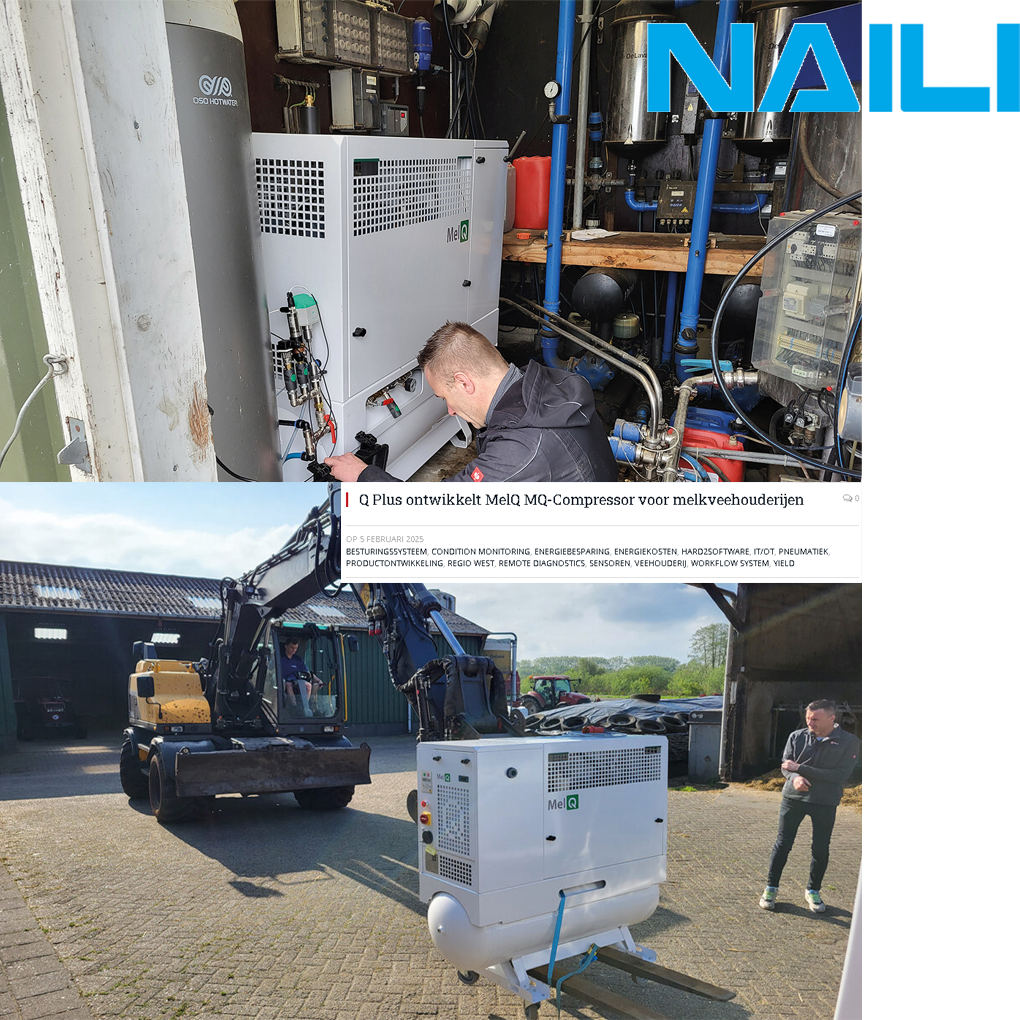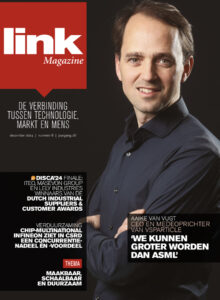

The machine is currently being tested on 25 Dutch farms.
Compressed air has been the core business of Q Plus , specialist in pneumatics in Sliedrecht, for thirty years. When livestock farmers asked for a compressor that provides dry air and is resistant to the adverse effects of the aggressive environment, Q Plus took up the challenge. The innovative result is MelQ MQ-Compressor .
NAILI has been cooperating with Q-plus in many ranges of application in European markets since 2017, and by the honor of NAILI would be able to provide an ideal of Oil-free air and Q-plus has further drafted out then to promote in Milk application since 2019! Apparently they got a very successful achievements in recent years!
NAILI also committed to long life and reliability in core of compressed air system and provide generation to the next in years!
Many dairy farmers depend on compressed air in their primary process. It is used, among other things, for milking with milking robots and operating the gates that give the cows access to the milking pit. Although farmers generally fall into the category of small consumers, the circumstances on a farm do place high demands on the quality of compressed air. Think of negative influences such as the outside temperature, the humidity and the presence of ammonia.
For decades, Q Plus has been improving and adapting pneumatic components for robust and durable use, taking into account the circumstances on a farm. When the optimum composition was achieved on the component side, the company took the next step: improving the quality of the compressed air to be used. This development has led to a new product, a compressor especially for dairy farmers: MelQ MQ-Compressor.
Clean dry air
'Eight years ago we started drying and filtering the air that goes into compressors,' says Serge Bertens, director of Q Plus. 'Wet compressed air washes away the lubrication from a compressor, which causes malfunctions.' One way to dry air is the refrigerant dryer, which is relatively energy-efficient and inexpensive to purchase. The disadvantage of the refrigerant dryer is that the moisture in the air still condenses when the system temperature drops below 3 degrees Celsius. In jargon, this is called the dew point. On farms, the temperature regularly drops below this temperature.
The problem of condensation can be solved with a so-called adsorption dryer, which uses granules to remove water vapour from the air. This dryer can dry air down to -40 degrees Celsius, so that no condensation is released later. The disadvantage of this type of dryer is that the device is more expensive to purchase and results in a 15 to 20 percent loss of the generated compressed air during the drying process. The MQ-Compressor combines both systems for air drying. With an ambient temperature sensor and a module for dew point control, the machine decides for itself which system is active for drying. On days colder than 3 degrees, the adsorption dryer, on warmer days only the refrigeration dryer.
The heart of the machine is a compressor that does not contain oil. 'Oil in a compressor provides lubrication, cooling and sealing,' says Bertens. 'When condensation water gets into the oil of a compressor, the oil can no longer do its job properly, with all the possible consequences. In addition, oil in a compressor requires more maintenance than a compressor without oil.'
A compressor is usually located in a technical room, where you do not have a direct view of it. 'You only look there when something is wrong', says Bertens. In order to prevent malfunctions or failures, the MQ-Compressor is equipped with an IoT module, which sends a message to the farmer or the dealer organization that performs the maintenance, via a portal, by text message or e-mail if something is wrong or is about to go wrong with the compressed air installation. Bertens: 'That could be a compressor malfunction, but also abnormal consumption due to, for example, a leak in the system. That makes it a reliable source of compressed air for farms.

Link magazine December 2024/January 2025 .
at: mireille.vanginkel@linkmagazine.nl
The machine is currently being tested on 25 Dutch farms. 'The results of the tests are good', says Bertens. 'Of course we want to have all the teething problems out of the system before we go to market with it. That will happen this year. The compressors are installed and maintained by dealers, who also supply other equipment to farmers, such as milking robots, cooling machines and vacuum pumps.' That maintenance includes replacing three filters annually. After 8,000 operating hours, a number of rings in the compressor block must be replaced, which must be done with 2,000 to 3,000 operating hours per year, once every three or four years.
One of those users is Peter Hilhorst , who has a dairy farm in Een, Drenthe. The machine has only been there for a short time, but so far it has been working fine, says Hilhorst. 'A previous compressor had a seizure after 20,000 hours. We have been using two A4 Lely milking robots since 2011 , in 2021 we switched to 2 A5 milking robots and the compressor now runs 2 to 3 hours a day. The advantage is that everything is in one system, including the dryer, and that very little maintenance is required on the machine. It is plug & play and a mechanic has set the pressure variations. In my opinion it is a good concept and Q Plus has a good story to go with it.' Hilhorst has not yet downloaded the MelQ app, but will do so. 'When a malfunction occurs, I can quickly see with the app whether the compressor plays a role in it. That is useful.
Bertens says that the development of the MQ-Compressor is technically motivated. 'This machine is quite high-tech for the low capacity that is required. In industry, large machines with a lot of power are used. They have drying and filter lines behind them. We have translated that concept into a small, robust machine. With this, we want to relieve the farmer of the maintenance of the machine and ensure a stable source of good compressed air. And show that we are more than a box pusher.' It is the first time that Q Plus has launched a new product on the market on this scale with its own engineering. Bertens: 'Having an idea is one thing. But making a competitive and conservative market enthusiastic about an innovative product is a fantastic challenge that we are happy to take on.'